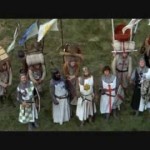We run our website the way we wished the whole internet worked: we provide high quality original content with no ads. We are funded solely by your direct support. Please consider supporting this project.
How do you respond to Matthew 24:1–44?
This is Jesus’ Mount of Olives discourse in which, according to many scholars, he prophesies concerning the conditions at the end of the age. “And you will hear of wars and rumors of wars; see that you are not alarmed; for this must take place (vs. 6)…nation shall rise against nation…there will be famines and earthquakes (vs. 7)…many false prophets will arise and lead many astray (vs. 11)…this good news of the kingdom will be proclaimed throughout the world (vs. 14)…at that time there will be great suffering, such as has not been from the beginning of the world until now (vs. 21)…Then the sign of the Son of Man will appear in heaven, and then all the tribes of the earth will mourn (vs. 30).”
Some scholars (such as N.T. Wright) argue that this passage is not about the end of the world as such, but only about the end of the Jewish world as they knew it. It is an apocalyptic (and thus heavily symbolic) description of things that were to take place within several decades after Jesus spoke of them. In support of this view, consider that the entire passage is structured as a response to the disciples’ question concerning when the temple will collapse (vs. 1–3). And Jesus tells his audience in no uncertain terms that “this generation will not pass away until all these things have taken place” (vs. 34, emphasis added). If this interpretation is accepted the passage has no bearing on the issue of God’s foreknowledge. In fact, we learn from Josephus that there were others in the early first century who were predicting that the temple was going to be destroyed, and we have no reason to think any of these people had divine foreknowledge.
Other scholars, however, argue that at least part of the passage refers to the very end of world history. Even if this latter group of scholars are right, we are reading too much into the passage if we suppose that it demonstrates that the future is exhaustively settled. Jesus prophesied that there will be wars (vs. 6), false messiahs (vs. 5, 24), famines and earthquakes (vs. 7) and persecutions (vs. 9). This simply means that the general features of how the world will end are settled and that God knows them as such. Given that the omniscient Lord knows perfectly the evil hearts of people and of fallen angels, and given that he knows that Satan and the kingdom of darkness are going to make one last all out effort to destroy God’s plan, as many other New Testament passages make clear, it should come as no surprise that God can accurately predict the turmoil the world will be in when history finally comes to a close.
Category: Q&A
Tags: Open Theism, Q&A
Topics: Open Theism
Verse: Matthew 24
Related Reading

Open2013
As I’m sure many of you know, the understanding of the Christian faith and the model of the Christian church is in the process of being transformed. All around the globe, and in a multitude of different ways, we are seeing new wine being poured out and old wine skins bursting apart. Many of us…

What’s the signficance of Judges 10:6-17
The Israelites rebelled against Yahweh and worshipped other gods. As a result, Yahweh withdrew his protection of them and “sold them into the hands of te Philistines and the Ammonites” (Judg. 10:6-7). The Israelites eventually acknowledged their sin and cried out to God (vs. 10) but Yahweh, perhaps perceiving that their repentance wasn’t genuine, told…

What is the significance of Isaiah 38:1–5?
God tells Hezekiah “you shall die: you shall not recover” (vs. 1). Hezekiah pleads with God and God decides to “add fifteen years” to his life. As we noted concerning 2 Kings 20:1–5, if God foreknew that he wasn’t going to end Hezekiah’s life, his declaration that he intended to do so and his decision…

Lighten Up: Oh my… I am so very very scared…
Well, my dear friend Frankie V. once again has a bad case of verbal diarrhea (explains his breath lately), running off about how he’s going to smack me down in our “all-out, no holds barred, ring-side seat, verbal wrestling match” on the open view of the future. I’m supposed to shutter in my boots at…
